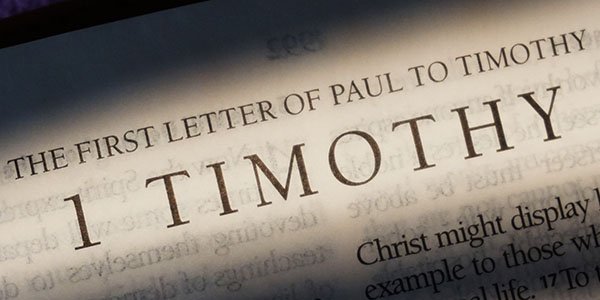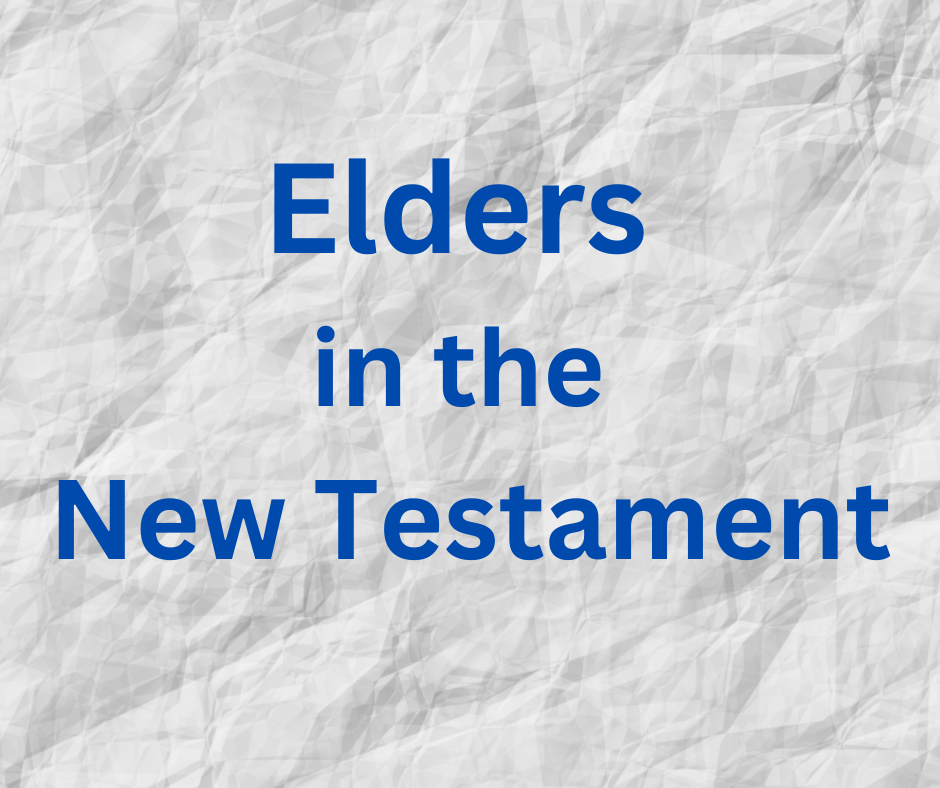1 Timothy 2 - An Opposite Reading
Sometimes having ideas challenged and tested can have a refining effect. Not only do I ask my usual questions in the study of the passage, but I would also take note of what an unbeliever, a skeptic, a doubter, or a completely new Christian might make in response to the text. This can help bring to light where the tension points are in a passage. Today we look at 2 views of 1 Timothy 2 with regards to false teaching and women in the church.
Q&A 1 Timothy: When was 1st and 2nd Timothy Written?
There are some sources that would date 1 Timothy earlier (such as the 50s) and 2nd Timothy later in the life of Paul. One of the difficulties in discussing the dating of 1 and 2 Timothy today is the prevalence of modernist and liberal scholars in the 1800s and 1900s who deny the authenticity of 1 and 2 Timothy as genuine works from Paul.
Order in the church: Paul the Sexist? [1 Timothy 2](Part 1)
The family is continually under assault in today's contemporary Western society. Even defining a family can be tricky today with as many "blended", "mixed", "multi-layered" and "modern" family units and styles as there are. We all know that "Yo Mama" jokes are a great way to alienate. But nowadays culture considers any sort of defined role within a family unit or structure as offensive, abusive, and evil, it's tough to put any concrete reason as to why "Yo Mama" jokes are offensive. If there are no mothers or fathers and we're supposedly all fluid anyway, these joke would not be offensive. When the most basic unit of the human experience is cast away, the society doing the casting is not long for this world.
1 Timothy Introduction
I’m stoked to be studying 1st Timothy, and myself having old sin, old idols, and old pride taken down and out. I’m looking forward to how the Lord will humble me, grow my loyalty to Him, and find enlivened trust in God’s Word. Let me encourage you today to take your excitement, and read 1st Timothy. May you be informed, instructed, and inspired as you read and submit to God’s Word.
Defining Biblical Hospitality
Hospitality is something every Christian should be doing, but what exactly is hospitality? Hospitality can mean different things based on your culture, and upbringing. Do some hospitality is what you receive when you stay in a hotel. Its a clean bed, space to be alone, a lavish breakfast and the ability to have your needs meet 24 hours day. For others, hospitality is someone opening their home for you to stay. Instead of a lavish breakfast, room to yourself, and your needs met 24 hours, you are invited into a home to help prepare the meals and to share rooms with others.
Acts 14:23 and the New Testament Elder
In Acts 14:23 (narrative, descriptive) we read that it was the Apostle Paul's pattern to appoint Christian elders within churches early on in the lifecycle of a church (1):
Paul and Barnabas appointed elders for them in each church and, with prayer and fasting, committed them to the Lord, in whom they had put their trust.
Origin of Paul’s Faith and Teachings- 1 Corinthians 11:23
We typically think of this verse as an introductory note in the larger, more important section about the Lord's table (v17-34). It is situated in the middle of both a rebuke and a corrective instruction for the Corinthian church regarding the practice of communion. While this sentence may seem like a simple linking idea, there is much to be learned from in considering these inspired Words from the Holy Spirit through Paul. This is a genesis, a backstory to all that he’s shared with the Corinthians.
Are Virtues "Progressively Successive"?-A Look at 2 Peter 1:5-9
The truism "you can't learn to run till you learn to walk" is an example of progressive succession. Is a progressively successive development of Christian virtue an accurate description of 2 Peter 1:5-9?
Elders in the New Testament - Elder, Shepherd, Pastor
We've already read that Peter used the term "shepherd" when speaking of elders (1 Peter 5:2). Paul also included shepherding language when addressing the elders in Ephesus (Acts 20). The term "flock" is used to describe the church in relationship to the elders. This informs us of something of the nature of the relationship of the community of believers (the church) and Christian elders.
Elders in the New Testament - Elder and Overseer
Today we will consider the first of the synonyms for Christian elders in the New Testament (there are more than this one, but in attempting to keep this a more digestible read I'm limiting today's discussion to one): Overseer. In future discussions we will examine other synonymous words and concepts for the elder (such as shepherd, and pastor).
Elders in the New Testament - Occasional Letters
Today, our discussion moves from the mostly narrative driven accounts of the Gospel and Acts, to the letters written by various Apostles to individuals, and churches in the rest of the New Testament. I'll continue with the "survey" format, simply citing a passage and giving a brief statement.
Elders in the New Testament - What do the Gospels and Acts say about Elders?
To give us a starting point for learning about Christian elders I'm going to cite several passages below which speak about Christian elders in the New Testament. Some of these passages are descriptive (describing elders), some are narrative (stories that includes elders), some are prescriptive (instructions for elders).
Introduction to 1 John Series
One of the unique aspects of John as a person is the period of time over which we see his faith lived out. While some New Testament writers only contributed a single letter to the New Testament, like James, Jude, Matthew, and Mark, John contributed multiple writings over multiple decades. While the Apostle Paul was used by God to write the greatest number of New Testament letters, John was used by God to write over the longest period of time.



](https://images.squarespace-cdn.com/content/v1/6372b5e9d5aa3248a612a348/1693311882655-N8GHTJN4Q4J5BHG1KKA8/1+Timothy+28-10+%281%29.png)









